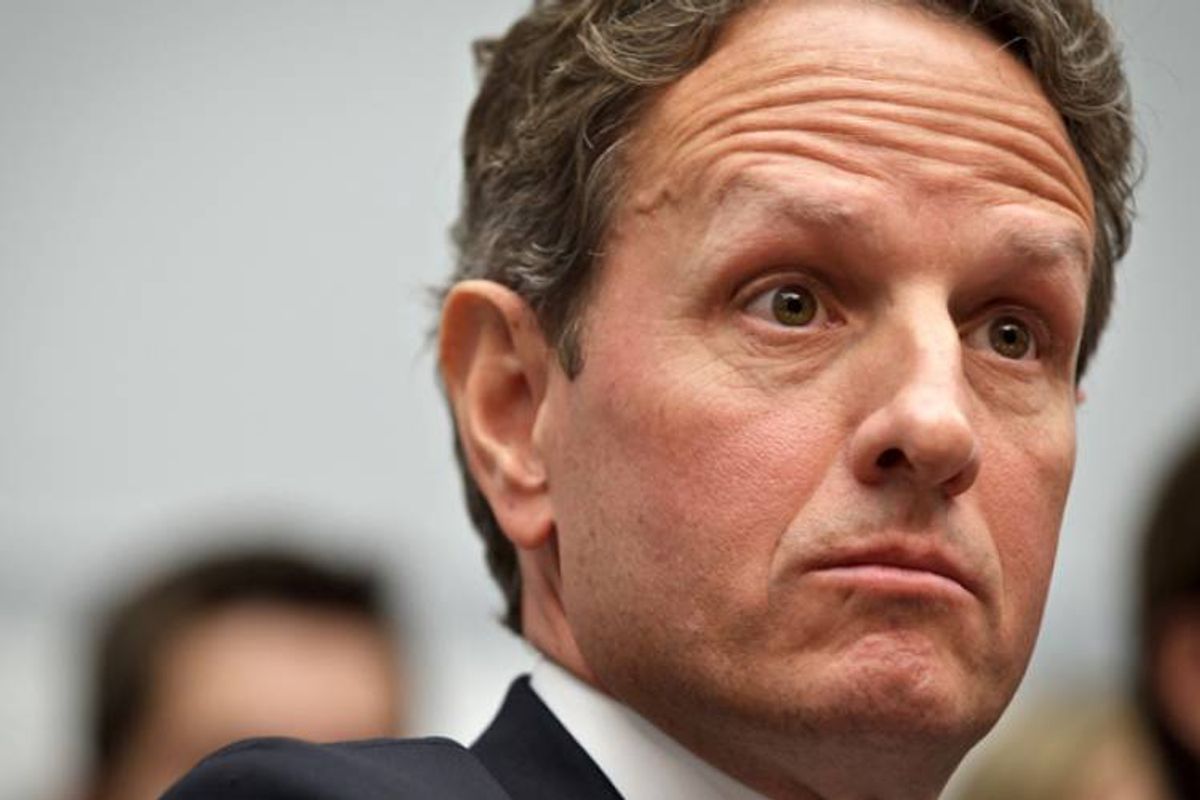Sometimes Democrats can be as bad as Beltway pundits in depicting genuine disagreements about policy and ideology as merely craven political posturing. I am reminded of that once again by the various buzzy excerpts of and commentary about former Treasury Secretary Tim Geithner’s new book “Stress Test: Reflections on Financial Crises,” which is out today.
Geithner quotes President Bill Clinton giving him advice about how to deal with the “populist” impulse to punish Wall Street malefactors: “You could take Lloyd Blankfein into a dark alley and slit his throat, and it would satisfy them for about two days. Then the blood lust would rise again.” He tells us that Sen. Elizabeth Warren’s TARP oversight committee hearings “often felt more like made-for-YouTube inquisitions than serious inquiries.”
He casts White House adviser Dan Pfeiffer, who opposed the administration’s ill-timed “pivot” toward deficit reduction and “Grand Bargain” hunting in 2011, as merely pandering to the Democratic base. Campaign strategist David Plouffe, meanwhile, is depicted as reflecting the conscience of the president when he reminds the team, “We didn’t run on a platform of permanently increasing the size of government.” Maybe more damaging, Geithner accuses Pfeiffer of asking him to lie on a Sunday show and say Social Security didn’t contribute to the deficit, again to placate the Democratic base. “It wasn’t a main driver of our future deficits,” he writes, “but it did contribute.” That misleading argument has been a staple of Wall Street Democrats’ efforts to cut Social Security.
On one level Clinton’s quote shouldn’t be surprising: His soft spot for Wall Street is well known, and Clintonian “Third Way” Democrats love to caricature the populist left as being motivated by hatred and “blood lust.” But it’s clear Clinton’s advice helped Geithner justify his own unwillingness to take seriously the genuine policy differences motivating the criticism of his progressive adversaries.
It’s worth noting that Geithner doesn’t reject all of the criticism. He accepts some responsibility for the financial crisis. “Before the crisis, I didn’t push for the Fed in Washington to strengthen the safeguards for banks, nor did I push for legislation in Congress to extend the safeguards to nonbanks,” he writes in “Stress Test.” He also admits to the shortcomings of the administration’s response, writing, “I wish we had expanded our housing programs earlier, to relieve more pain for homeowners.”
The former Treasury secretary is stubbornly proud of the fact that he never worked in investment banking, recounting many anecdotes in which people who should have known better insisted otherwise. But he can’t seem to understand that he could still be a captive of bankers’ interests without being one of them himself.
Having just finished Warren’s own memoir, “A Fighting Chance,” I found it arrogant of Geithner to diminish her TARP-oversight work as mere YouTube vamping. Maybe it’s payback: Warren certainly takes a few shots at Geithner in her book, depicting him as mostly ignoring her oversight efforts if not actively thwarting them. He’s proud of the fact that TARP’s bank bailout, by his calculation, made taxpayers $32 billion in profit, given that Warren and other critics alleged the money was merely a giveaway to big banks. But he doesn’t wrestle with the argument that the crisis response could have and should have done more to rein in and restructure a financial industry that has been privileged above all others by a series of bipartisan policy decisions going back to the 1980s.
Geithner seems weirdly fatalistic about changing that industry either by policy or symbolism. You can never make sure banks aren’t “too big to fail,” he tells Andrew Ross Sorkin; there’s always some imaginable catastrophe that would force another government bailout. Regulators can’t really change banking “compensation” practices, so why bother railing against obscene bonuses for the men who ran the economy into a ditch? That’s why, rather amazingly, when White House communications staffer Stephanie Cutter developed talking points for Geithner and President Obama criticizing big bankers’ bonuses in 2009, Geithner ignored them, leaving Obama on his own to draw the bankers’ wrath for what was actually a mild rebuke.
Geithner's anecdotes about Cutter and Dan Pfeiffer are starting to get pickup on the right, which was predictable. Neither did anything wrong: Cutter articulated what was supposed to be the administration's position about bankers' bonuses, while Pfeiffer may have given political reasons for what was a sound policy argument: Social Security is funded via payroll taxes, and its "deficits" or surpluses can be adjusted by changing tax rates. Progressive economists like Dean Baker and Paul Krugman agree with Pfeiffer.
Obama kept Geithner on long after the Treasury secretary told him he wanted to go, and even considered him strongly to succeed Ben Bernanke as Fed chair, the job that went to Janet Yellen. The president is still paying politically for choosing an economic team that harbored not just skepticism but hostility to a dramatic reordering of government priorities when it came to the treatment of banks and the investor class.



Shares